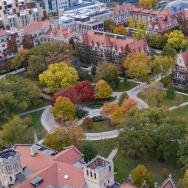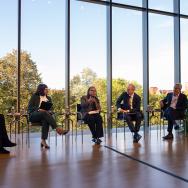What might peace in the Middle East look like? That is the question that the University of Chicago Forum on Free Inquiry and Expression will examine when it hosts a series of three events for the UChicago community this month featuring leading scholars from the University and around the world.
The conversations, which come at the one-year anniversary of the war in Israel and Gaza, also will explore how the UChicago community can engage in dialogue with one another about possible paths forward. The events reflect the Chicago Forum’s mission to promote the understanding, practice, and advancement of free and open discourse at UChicago and around the world. They are open to UChicago students, staff, faculty and other academic appointees, and postdoctoral researchers (registration and UChicago IDs required).
“These opening events reflect upon deeply personal and polarizing issues, but the Chicago Forum aims to encourage these kinds of difficult conversations in an open and respectful manner,” said Tom Ginsburg, the Leo Spitz Professor of International Law at UChicago and the faculty director of the Chicago Forum. “Even as the immediate possibility of peace seems to be becoming more remote, we need to find spaces to talk about our plural visions of the future in the region.”
In the opening event Oct. 10, Ginsburg will be in conversation with Prof. Salam Fayyad, former prime minister of the Palestinian Authority and visiting senior scholar at Princeton University. Prof. Nicholas Epley of Chicago Booth also will lead an exercise exploring ways of engaging constructively with fellow audience members with diverse views.
The event, part of the Chicago Forum’s Zell Speaker and Event Series, will begin at 4 p.m. at International House. It is co-sponsored by the Chicago Forum, International House, the Pearson Institute for the Study and Resolution of Global Conflicts, the Center for Middle Eastern Studies and the Pozen Family Center for Human Rights.
“These opening events reflect upon deeply personal and polarizing issues, but the Chicago Forum aims to encourage these kinds of difficult conversations in an open and respectful manner.”
On Oct. 14, Ginsburg will lead a discussion with Arnon Hershkovitz, associate professor in the School of Education of Tel Aviv University, entitled “Rebuilding a Better Society: Hostages Square as Israel's Ground Zero.” Hershkovitz, who began volunteering with the families of Israeli hostages and evacuees after the war broke out, will examine the possible trajectories for Israeli society as well as the region. The event, which will be held at 4 p.m. at the Chicago Forum’s home at 5737 S. University Ave., also will provide time for attendees to engage in dialogue.
In the final event of the series, “Bridging Deep Divides: Compassion, Discourse and Free Expression” on Oct. 23, Tony Banout, executive director of the Chicago Forum, will speak with Prof. Jennifer Brick Murtazashvili of the University of Pittsburgh. Murtazashvili, the founding director of the Center for Governance and Markets and professor of international affairs at Pitt, co-leads projects that bring community members together in dialogue. Her projects aim to show how empathy and compassion are complements to free expression, often essential for engaging in difficult conversations constructively. The event, which will begin at 5 p.m., will be held at 5737 S. University Ave.
Looking toward the future
Launched in October 2023, the Chicago Forum had an ambitious first year, hosting more than a dozen events—often on difficult subjects. In addition, it extended its reach through its Academic Freedom Institute, in which leaders from more than 20 colleges and universities attended workshops on implementing academic freedom programs; funding for faculty and student research projects; and an orientation program to introduce new members of the UChicago community to free expression.

UChicago recently announced it had received a $100 million gift to support its historic commitment to free inquiry and expression, which will advance the Chicago Forum’s ambitious work on campus and beyond academia. These three events are the first in a number of thought-provoking conversations this academic year hosted by the Chicago Forum. Future conversations this academic year will examine attacks on academic freedom, a reflection on COVID and preparing for future pandemics, a discussion on just immigration policy and the 10th anniversary of the Chicago Principles on free expression.
“What excites me most about our work this year is the proactive cultivation of a space in which all of these ideas — from academic freedom and its challenges and limitations, to what peace may look like — are contestable and open to conversation within our community,” Banout said. “No assertion, no claim, no perspective, is immunized from good-faith inquiry. What is critical is developing the habits and skills for free and open discourse.”
UChicago students, staff, faculty and academic appointees can register for the October events and find more information at the Chicago Forum website. Suggestions for future conversations can be shared with the Chicago Forum team by emailing thechicagoforum@uchicago.edu.








